KEY POINTS
- The Food Hospital has not been shy to demonstrate medicinal effects of foods that are often depicted as the sole preserve of drug therapy
- Patients with long-term and serious problems are shown undergoing major or complete recovery in a matter of days or weeks from starting their new diets
- Supplements such as Omega-3 and probiotics are shown to be effective in dealing with inflammatory and gastrointestinal conditions, respectively
- A few areas of suspect advice were identified by ANH
- The Big Food Trial, the online trial that engages viewers to compare the effects of particular foods on various disorders, is a lost opportunity as it tests inappropriate foods like chocolate.
We must congratulate the makers of The Food Hospital on UK TV’s Channel 4, an eight-part series that, “Examines the science behind using food as medicine”. Normally, this concept receives very little mainstream airtime. That being said, there have been some anomalies and inconsistencies in the first two episodes, as well as a huge opportunity lost in the programme’s Big Food Trial. We wonder if the programme makers fully appreciated just how much this trial plays into the hands of Big Food, even in its name? But more on this below.
The programme feature’s three main experts, a general practitioner, Dr Giovanni Miletto, a consultant gastrointestinal surgeon, Mr Shaw Somers and a dietician, Lucy Jones. In order to evaluate the effect of the nutritional regimes prescribed by the trio, the patients followed during the course of the programme are asked to remain on any drugs already prescribed, so that improvements in their health can be attributed to the dietary changes, and not to any effects from them coming off their drugs (a concept that warms our hearts in its own right).
The state of the debate around ‘food as medicine’
It’s ironic, given Hippocrates’ status as the ‘father of modern medicine’ and even more famous quote attributed to him, “Let food be thy medicine, and medicine be thy food”, that orthodox medics receive so little formal training in the nutritional sciences. It generally represents just a day’s learning in some 6 years of medical training. The related professionals, dieticians and nutritionists, by contrast, are immersed in the science of nutrition throughout their training, albeit each discipline having a somewhat different emphasis. Dieticians tend to work alongside the mainstream, allopathic (drug-based) medical profession, while nutritional therapists tend more often to work independently, often with a sense that nutrition and lifestyle changes can avoid the need for drugs. There are very real concerns that dietetic science, as practiced by dieticians in Europe, the USA and in other parts of the western world, has become distorted by its close association with Big Food. In the USA, this has stimulated our sister organisation, ANH-USA to release — just yesterday — a new campaign, Really Eat Right, targeting the American Dietetics Association.
Unsurprisingly, governments listen to the medics and dieticians when developing nutritional recommendations. This situation results in inadequate and even incorrect guidance like the US Department of Agriculture (USDA) food plate or the UK National Health Service (NHS) ‘eatwell plate’ (Figure 1). These guidelines reveal the footprint of Big Food, over-emphasise the importance of grains and (processed) dairy, while recommending all foods in moderation – even the harmful ones. In our view, diets based wholly on this advice do little to stem the tide towards insulin resistance, metabolic syndrome, type 2 diabetes and obesity, that have together emerged as among the biggest challenges in healthcare in the West, and increasingly in other parts of the world.
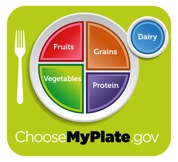
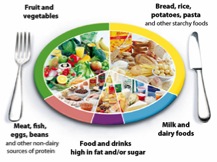
Figure 1. The USDA food plate (left) and the NHS ‘eatwell’ plate (right)
The Food Hospital episode 1 (1st November 2011): grains are good, superfoods aren’t super
Firstly, a lady with severe polycystic ovarian syndrome (PCOS) was given a hormone-balancing programme that included plenty of vegetables, pulses and whole grains. We question the inclusion of whole grains to treat this patient, who was essentially pre-diabetic, because many PCOS patients have gluten sensitivity and even whole grains trigger an insulin response.
It was a pleasure however to witness a wonderful success in a 7-year-old boy, who was cured of recurrent migraines by an additive-eliminating diet. Isn’t it interesting that so many dieticians and government authorities continue to claim that synthetic additives in processed foods are safe? This is of course the result of more manipulation by Big Food.
Next was the case of a man with rampant type 2 diabetes (T2D). The Channel 4 ‘experts’ immediately put him on an 800 kCal/day diet, directly from 5000 kCal/day! The new diet replaced all three daily meals with protein shakes plus some non-starchy vegetables. This is basically a crash diet, and there is a risk that any benefits in terms of fasting glucose and weight loss may be reversed after the patient resumes normal eating. This is the very process that can lead to the much-publicised yo-yo dieting effect that not only doesn’t deliver the long-term results desired, it is also known to be harmful.
Finally, there was a superficial investigation into ‘superfoods’. The programme proposed that new potatoes are as much a superfood as blueberries, and the term ‘superfood’ is a marketing term that should be banned as it is unhelpful to consumers. As it happens — to our dismay and that of millions of EU citizens — this is exactly what the new European Union health claims regime is planning to do next year! A test carried out under the eye of the camera revealed that two puréed punnets of blueberries reduced the presenter’s blood pressure. This begs the facetious question: if blueberries are not a superfood yet have this effect, can all foods do this? [Answer: NO!] But how often are blueberries and other antioxidant foods used in the manner of a drug?
The Food Hospital episode 2 (8th November 2011): foods and supplements work better than drugs
It’s not often we see the mainstream media, in this case the UK’s Channel 4, telling us that food and supplements can be used to treat disease. Well, this is what was beamed into the living room of hundreds of thousands last night.
This episode tracked the progress of a mother and son suffering from severe psoriasis, a singer with acid reflux, an obese man with an enlarged, fatty liver and a teenage girl with alopecia and irritable bowel syndrome (IBS) after they were administered foods as medicines. Each patient was put on a case specific diet, these being, in principle, anti-inflammatory, anti-oxidant and calorie-restricted, respectively. Interestingly, two of these diets included supplements; anti-inflammatory Omega 3s for the mother and son with psoriasis, and probiotics (Bifidobacterium infantis 35624) for the teenager with IBS and alopecia.
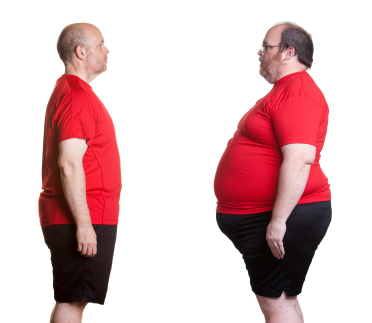
Before and after pictures of man with 16 months nutrition and exercise changes and losing 180 lbs.
The improvements in all cases were vast, and had they been the result of drug use, we no doubt would have to endure the pharmaceutical industry shouting from the rooftops for days to come!
Dr Pixie McKenna was later tasked with looking at the science behind food supplements and her conclusions appeared to be a little misplaced, to say the least, in light of what was happening in the four cases aired in the same episode. Her overarching conclusion was that people were better off not wasting their money on supplements and should buy more fruit and vegetables instead. Does that mean that the Omega 3 and probiotic supplements that were declared invaluable in two out of four cases aired in the same episode were unnecessary? Of course not! What Dr McKenna’s comments revealed instead was the deeply ingrained distaste of supplements by a large sector (but not all) of the medical and dietician professions. It’s worth pondering that most of the negative studies associated with use of vitamin and mineral supplements have been undertaken directly or indirectly by Big Pharma, using usually synthetic forms of isolated forms, often inappropriately.
The Big Food Trial: a trial for Big Food
Again, hats of to The Food Hospital for engaging directly with the public with a view to testing the effects of particular food choices on common disorders. But sadly, in our view, the experiments themselves are deeply disappointing. They aim to test whether foods can alleviate particular conditions, namely high blood pressure, high cholesterol, memory loss and insomnia, but the foods being tested are wholly inappropriate and it seems they may have been selected more to help promote various products of Big Food, rather than to deliver the most effective results.
For example, white and dark chocolate are being compared for their effects on blood pressure. Cadbury and others will love this one, they won’t mind which way the experiment goes, even if it fails – they have a foot in all camps! If this wasn’t bad enough, dark and white chocolate are again the foods being tested for memory skills. For cholesterol lowering, 30 almonds will be compared with 5 crackers.
Apart from suggesting that the experimental designers may have themselves gone crackers, we do feel this is an exceptional lost opportunity. It also treats foods as drugs, comparing only a single food type, following the same general protocol as used in conventional randomised controlled trials where only one or very limited numbers of variables are altered. This approach is wholly inappropriate for comparisons of diet and lifestyle.
Don’t miss next week’s programme
Episode 3 airs again next Tuesday night (Channel 4, 8.00 pm). Given that Episode 2 outshone the first episode, we have high expectations for next week. Watch it if you’re able!
So far the programme’s experts have remained mute on any comparison of the foods and supplements they have prescribed with the concomitant use of drugs already being taken by their patients. Will they ever dare air the startling comparison?




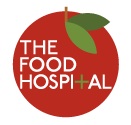

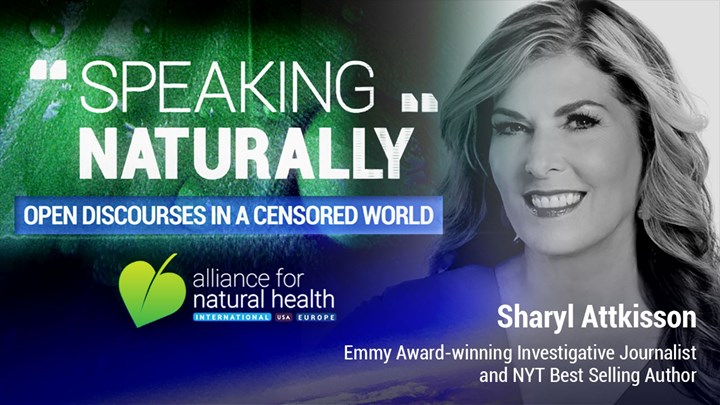

Comments
your voice counts
10 November 2011 at 1:39 am
I have type 2 diabetes and am trying to find out more about the 800cal. per day trial, but i can't seem to find any guidelines as to what i should eat. Doctor doesnt seem to know anything, can you give me information to take to my doctor to see if i can start this trial and get off all these pills and save the NHS some money and maybe help cure me of this condition, please help.
Matt at the Abbey
10 November 2011 at 2:38 pm
None of the trials being run by The Food Hospital deal directly with diabetes (type 2). Furthermore, there are no general guidelines that would apply to all people with type 2 diabetes, as each person tends to respond differently, and the severity of the disorder, or extent of insulin resistance, may be quite different between individuals. One approach that we are aware is delivering remarkable results is the Metabolic Balance programme, born out of 20 years research in Germany. It involves developing an individualised dietary regime after a blood test is undertaken to determine your status. You can find out more about Metabolic Balance at www.metabolic-balance.com and there is a 'find a coach' tab that will allow you to discuss the options with a suitably trained practitioner. We hope this helps.
10 November 2011 at 4:14 pm
You may also be interested in reading this article: http://anhinternational.org/news/is-the-rise-of-type-2-diabetes-as-unstoppable-as-governments-make-out
10 November 2011 at 4:29 pm
Thank you!
11 November 2011 at 6:44 pm
I was both disappointed and annoyed by this programme. Disappointed because of the shortcomings and bias pointed out in this article. Annoyed, because if any of us or small food producers tried to make "medical or health" claims for food, we'd be in court in five minutes flat!
11 November 2011 at 7:02 pm
The Food Hospital appears to be a long overdue step forward for mainstream TV. I do however take exception to their apparent oversight that fruit and vegetables often lack sufficient nutrient content due to modern farming practices and distribution methods. This is one important reason why people supplement their diet. Then we are told that in general supplements are unnecessary. The programme makes no distinction between synthetic ones and purely plant based ones. The former is often rejected by the body as foreign, while human tissue recognises the later as nourishing.
Take the example of MSM (organic sulphur) which is present in many foods but mostly lost during cooking. Arthritis, joint problems, inflammation, allergies all respond well to MSM supplementation, particularly in middle age and beyond when nutrient absorption decreases. Honey, Bee Propolis and Bee Pollen are further examples of well balanced, nutrient rich supplements, which boost human immune systems. Supplements like these take over where supermarket fruit & veg fails.
11 November 2011 at 8:57 pm
Here's a couple of links that have lots of info, not on the 800 cal per day thing, but various dietary information, much of which has been used for years and has produced definite and beneficial results...
http://www.naturalnews.com/Type_2_diabetes.html
http://www.naturalnews.com/029328_diabetes_electromagnetic_pollution.html
http://www.naturalnews.com/diabetic.html
The website these links are from is well respected and has various contributors from both alternative and mainstream medicine. I am sure you will find some useful information there!
All the best!
11 November 2011 at 9:32 pm
Another great piece from the Alliance!
It was confusing, contradictory and poor journalism to make generic statements including “people should not waste money on vitamins and supplements”, yet also show how incredibly powerful fish oil and probiotics (food supplements last time we looked!!) can be.
However, it is incredibly refreshing to see television like this, and several of the success stories were inspiring, although some of the strategies employed were misguided we felt.
We have asked the Food Hospital for the reference on the high dose Vitamin C study that was mentioned, but this as yet has not been forthcoming; we have been unable to find any reference to this?
We are also very disappointed in the studies, strange choices, but a step in the right direction at least, we will continue to watch with interest!
11 November 2011 at 11:08 pm
I think ANH should look at Food Hospital Partners.
http://foodhospital.channel4.com/partners/#Wellcome%20Trust
Try sense about science and google gm food
no. 6.
http://www.senseaboutscience.org/pages/further-information.html
I think we really need to watch out here.
e.g. The Nuffield Council on Bioethics published a discussion paper, The use of genetically modified crops in developing countries in 2007. I had a quick look at this. It's rubbish and disturbing in the extreme.
Do we need to discuss those involved with the programme the views of some of the partners - you would think there would be a conflict of interest. Would be interested in your comments.
Take a look at the GM working group baddies:
Working group biographies
http://www.senseaboutscience.org/pages/further-information.html
Theresa
12 November 2011 at 8:04 pm
I have just about managed to watch the first two episodes of the food hospital. I do feel that any thing on TV paints a dark view of health via food and espescially via herbs or vitamins. I am currently helping a friend who had breast cancer in 2009 and that was treated by the NHS. She did end up having one breast removed. Now in 2011, the cancer has come back, now in several places as lesions on her bones. Three weeks ago she was in a very bad way, in the foetal position, in bed, skin and bone and in immense pain.
Since changing her diet to raw organic, introducing antifungal herbs/supplements, juicing, apricot kernals, essiac tea and FOOD GRADE VITAMIN C supplements she is up talking, relaxed, some walking about and putting weight back on and she looks amazing. This change is in 3 WEEKS!
Yet in episode 2,they beamed in to millions of peoples homes the false and very damaging statement that prolonged use of Vitamin C can cause breast cancer! This makes me so angry, this programme says so many wrong statements. How can they claim things like this without giving us any evidence. The tests that they were refering to were probably and yet again not conducted properly and with inferior vitamin qualities.
13 November 2011 at 6:14 am
Dear Matt at the Abbey,
Go on a low carb, high fat diet. There is a huge amount of evidence both anecdotally and through studies that this will bring insulin levels down and can actually reverse some if not all of the damage done.
Nobody stands to make money from this diet and if you do a search you will find hundreds of blogs of passionate people just wanting to get the word out that this diet is amazing in healing all kinds of problems including metabolic syndrome. Also look up Dr Jay Wortman, a doctor who had been on the low carb, high fat diet for eight years because of his own predisposition to diabetes type 2 (himself part eskimo) and has made a documentary on his work with the Canadian eskimos with diabetes type 2 and the results they have had. The diet is very easy. Eat meat (all kinds) lots of animal fat and coconut oil, and non starchy vegetables, eggs, fish. I have been this diet for 18 months and the improvements to my health and my husbands are outstanding. If you look on the internet there is a wealth of information. You will initially crave carbohydrates but it will go. Just remember to fill up on fats when you eat and to begin with eat every 2-3 hours or so.
13 November 2011 at 4:25 pm
Purchase a copy of the book; "There Is A Cure For Diabetes", by Dr Gabriel Cousens, who is the worlds leading authority on diabetes, and as I did, CURE your diabetes in 21 days.
Do not hesitate to contact me for any assistance you may need, but regrettably, your doctor will be of little help, because his/her approach is toxic drug based.
Sincerely,
Norman.
15 November 2011 at 1:20 am
As a great admirer and supporter of ANH I am dismayed to see that you have not done your homework about the Food Hospital programme partners. You surely know about Sense about Science. Bazian is also interesting; below is a copy from their website about some of their work (read especially the last two paragraphs).
Begins quote from Bazian website:
MMR (Measles Mumps Rubella) vaccine
Client
British Medical Association
Background
In what is now a well known story, a controversial piece of research in 1998 claimed there was a link between the measles mumps rubella (MMR) vaccine and autism in children. A certain press conference initiated a lot of media coverage, and a “social panic” spread across the UK. By 2002 vaccination rates had fallen past the point at which measles could re-establish itself in the population.
The problem
Given the danger this represented, the British Medical Association (BMA) wanted to know whether there was any validity to the purported link between the vaccine and autism so it could advise the medical community appropriately. It needed the answer to be robust and rapid, so the BMA turned to Bazian.
Our solution
Bazian conducted a rapid systematic review looking at more than 2000 studies published over 50 years. We found no link between the MMR vaccine and autism whatsoever.
The outcome
Armed with a bulletproof systematic review, the BMA conducted a media and public education campaign which Dr Vivek Muthu and Dr Anna Donald from Bazian supported on radio and in print media. Vaccination rates are now above 90% in most areas of the UK, and many children who would have died or suffered severe complications from measles, mumps and rubella are fit and healthy.
15 November 2011 at 3:21 pm
Many thanks for your comment, and for your kind words about our work - up to now! We're sorry that the Food Hospital piece was not to your liking, but we are happy to explain our reasoning.
We are, of course, familiar with Sense About Science - for example, please see our articles here (http://anhinternational.org/node/242) or here (http://anhinternational.org/news/lord-taverne-tries-to-shut-down-university-chinese-medicine-courses). As for Bazian, we have in the past pointed out their role in questionable research that supports the establishment position on food supplements, water fluoridation and the MMR vaccine (http://anhinternational.org/news/nhs-reforms-itself-to-suit-european-line-on-food-supplements).
In the case of Food Hospital, we are simply telling it as we see it! There is no doubt, as you point out, that the programme has some very unsavoury connections. However, much of the advice given in the second programme of the series made genuine and dramatic improvements in the lives of the people featured in the episode. It would have been churlish of us not to applaud the transformation of people's lives through good nutritional advice - regardless of the programme's links to groups we deplore.
Having said that, the programmes were a long way from perfect, and we were very clear in our article about what we feel were serious errors in the advice given to certain patients. For example, "Next was the case of a man with rampant type 2 diabetes (T2D). The Channel 4 ‘experts’ immediately put him on an 800 kCal/day diet, directly from 5000 kCal/day! The new diet replaced all three daily meals with protein shakes plus some non-starchy vegetables. This is basically a crash diet...that not only doesn’t deliver the long-term results desired, [but] is also known to be harmful."
We are also concerned at the lightweight 'investigations' fronted by Dr Pixie McKenna, which seem designed only to promote the mainstream views on topics like superfoods, antioxidants and food supplements.
We are aware that the Food Hospital is only two episodes into an
eight-episode run. As such, our opinion of the programme may change
depending upon the content of future episodes. However, in many ways, we feel that a mainstream TV programme that promotes the concept of 'food as medicine' is a huge step forward in several ways. Not only are people whose lives have been blighted by chronic conditions shown to gain enormous benefit from simply changing their diets, but many of these people were beyond the help of orthodox medicine. That is an incredibly powerful message for the public consciousness to take on board.
For the moment, then, we will continue to comment about the programme based on the facts and information presented, rather than on the background to the programme or its partners. In wishing to see the transformation of the lives of very large numbers of people who have bought the notion that drugs are required because diet and lifestyle would not be able create sufficient change to the course of serious diseases, this programme could have a very significant effect — regardless of the partners. However, the partners, in
our view, become particularly relevant if the notion of ‘food as medicine’ is taken significantly off course – they offer a likely explanation. We can assure you that we will keep a close eye on the series as it develops and will comment again accordingly.
Your voice counts
We welcome your comments and are very interested in your point of view, but we ask that you keep them relevant to the article, that they be civil and without commercial links. All comments are moderated prior to being published. We reserve the right to edit or not publish comments that we consider abusive or offensive.
There is extra content here from a third party provider. You will be unable to see this content unless you agree to allow Content Cookies. Cookie Preferences